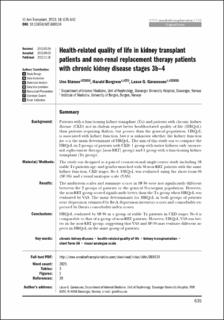| dc.contributor.author | Stømer, Une Elisabeth | |
| dc.contributor.author | Wahl, Astrid Klopstad | |
| dc.contributor.author | Gøransson, Lasse | |
| dc.contributor.author | Urstad, Kristin Hjorthaug | |
| dc.date.accessioned | 2020-03-19T08:22:45Z | |
| dc.date.available | 2020-03-19T08:22:45Z | |
| dc.date.created | 2020-01-22T14:34:05Z | |
| dc.date.issued | 2020-01 | |
| dc.identifier.citation | Stømer, U.E., Wahl, A.K., Gøransson, L.G. et al. (2020) Health literacy in kidney disease, associations with quality of life and adherence. Journal of Renal Care | en_US |
| dc.identifier.issn | 1755-6678 | |
| dc.identifier.uri | https://hdl.handle.net/11250/2647481 | |
| dc.description.abstract | Background
Health literacy (HL) is a multidimensional concept with significance for self‐management and health outcomes in patients with chronic kidney disease (CKD); however, research with a multidimensional perspective on HL is scarce.
Objectives
This study aimed to explore the relationship between multidimensional HL, quality of life (QoL) and adherence to long‐term therapy in CKD patients.
Design
A descriptive single‐centre cross‐sectional study.
Participants
Patients with CKD in stages 3–5 were recruited from the nephrology unit in a Norwegian hospital.
Measurements
The Health Literacy Questionnaire (HLQ) was used to assess HL, QoL was measured by the Short Form‐12 (SF‐12) and a Visual Analogue Scale (VAS‐QoL). Adherence to long‐term therapy was measured by the Medical Adherence Rating Scale 5 (MARS‐5), participants' prescription withdrawals from pharmacies, and a VAS (VAS‐adherence). Hierarchical cluster analysis was performed to group patients with similar HLQ scores, and multiple linear regression analysis was performed to identify the HL dimensions that were associated with QoL and adherence to long‐term therapy.
Results
A total of 187 patients were included, 65% were male, and the mean (SD) age was 67 (13) years. The high‐level HL group (N = 52) had significantly better QoL than patients in the mid‐level (N = 106) and low‐level (N = 27) HL groups. The HL dimensions “actively managing health,” “actively engage with healthcare providers,” “ability to find good health information” and “ability to understand health information” were predictive of QoL and adherence to long‐term therapy.
Conclusion
HL seems to be important for both QoL and adherence to long‐term therapy. | en_US |
| dc.language.iso | eng | en_US |
| dc.publisher | John Wiley & Sons Ltd. | en_US |
| dc.rights | Navngivelse-Ikkekommersiell 4.0 Internasjonal | * |
| dc.rights.uri | http://creativecommons.org/licenses/by-nc/4.0/deed.no | * |
| dc.subject | nyresykdom | en_US |
| dc.subject | renal care | en_US |
| dc.subject | helsevitenskap | en_US |
| dc.subject | kronisk sykdom | en_US |
| dc.title | Health literacy in kidney disease, associations with quality of life and adherence | en_US |
| dc.type | Journal article | en_US |
| dc.type | Peer reviewed | en_US |
| dc.description.version | publishedVersion | en_US |
| dc.rights.holder | © 2020 The Authors. | en_US |
| dc.subject.nsi | VDP::Medical disciplines: 700::Clinical medical disciplines: 750 | en_US |
| dc.source.journal | Journal of Renal Care | en_US |
| dc.identifier.doi | doi.org/10.1111/jorc.12314 | |
| dc.identifier.cristin | 1780195 | |
| cristin.unitcode | 217,13,2,0 | |
| cristin.unitname | Avdeling for kvalitet og helseteknologi | |
| cristin.ispublished | true | |
| cristin.fulltext | original | |
| cristin.qualitycode | 1 | |

